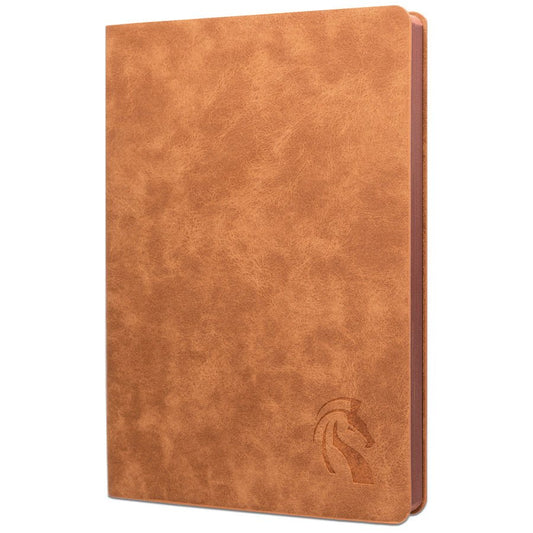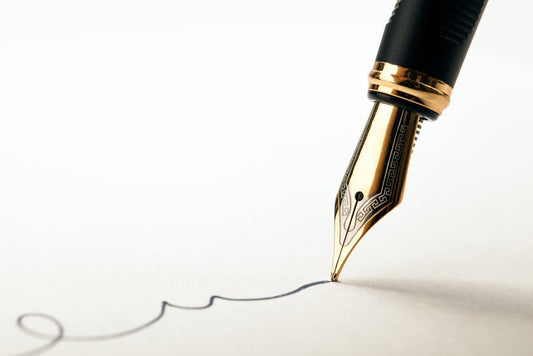
One of the most effective methods of personal development is literally at your fingertips.
Exercise and proper sleep hygiene are not the causes (although these are great habits). In fact, it's something quite basic, like discovering the fundamentals of journaling.
Journaling is enjoying a renaissance despite having been practiced for thousands of years. The transformative effects of journaling are widely touted, from the pages of self-help blogs to the works of bestselling authors like Deepak Chopra.
Despite its recent meteoric rise in popularity, this isn't some fluffy new age self-help fad. Maintaining a regular practice can have far-reaching effects on one's health and well-being on all levels of being.
Let's talk about the value of journals and how to make journaling a regular part of your routine.
Journaling as a whole.
It's important to get a firm grasp on the meaning and value of journaling before committing to a regular practice.
Exactly what is this thing called a journal?

Keeping a journal is a great way to document your innermost feelings and reflections as you go about your day.
There is no single best way to keep a journal, and that's part of its appeal. It is highly individual and can take many forms.
Maybe one day your journal entries will look like the diaries you kept as a teenager. The next day, write down what makes you happy or what you want to accomplish.
Keeping a journal is a great way to process your feelings and get through tough times, like when you're anxious or depressed. It has the potential to foster development, increased self-awareness, and profound introspection.
How do men start journaling?
Because of these benefits, journaling is a powerful method for personal development.
Some of the most successful people in the world, such as Richard Branson, Warren Buffet, and Arianna Huffington, have kept journals all their lives, which probably doesn't come as much of a surprise to you.
The Value of Keeping a Journal
Though putting pen to paper may seem like a minor step, the effects can have a significant impact. Some of the upsides of maintaining a diary are listed below.
1. Promotes emotional health and happiness

The COVID-19 pandemic has caused an unprecedented amount of anxiety and unpredictability.
Four out of ten adults in the United States have suffered from anxiety or depression at some point in their lives.
The therapeutic release of writing in a journal can be a lifesaver for those struggling with the weight of overwhelming feelings and a lack of direction during trying times. Keeping a journal has been shown to improve mental health and lessen the symptoms of depression and anxiety.
2. Improves resistance to illness and the speed of recovery
Like the old adage goes, "An apple a day keeps the doctor away," keeping a journal daily has been shown to have similar health benefits.
According to a study conducted at Cambridge University in 2018, participants were asked to reflect on the most difficult experiences they'd ever had and write down their thoughts and feelings about them.
There was a reduction in doctor visits and absences from work for those who kept a journal for 15 minutes a day.
Journaling has been linked to both shorter recovery times and longer-term reductions in health problems. Another study found that when used on older adults, creative writing aided in the speedy recovery from wounds.
3. Serves as a forum for thankfulness expressions

Keeping a gratitude journal in which you record the things for which you are thankful is a powerful form of expression of gratitude. Brain regions associated with happiness are triggered when one practices gratitude.
young-woman-journals-in-nature-how-to-start-journaling
In addition to these positive effects, an attitude of gratitude can help you feel more optimistic and compassionate.
4. Assists in overcoming difficulties
Researchers have found that keeping a journal can be a useful tool for overcoming trauma and moving on from difficult experiences.
Recently, researchers at Duke University asked people who had recently experienced trauma to take part in a six-week writing "intervention" that included expressive, poetic, transactional, and mindful journaling.
The study's participants were more resilient and experienced less stress after writing.
5. Facilitates goal-setting and follow-through
Putting your objectives on paper is a surefire way to see them through.
Writing down your goals will help you to better picture them in your mind. Both top athletes and business leaders rely heavily on the mental tool of visualization. Visualization is the mental process of convincing oneself that a desired outcome has already been achieved.
People who write down their goals have a better chance of achieving them than those who don't, according to research published in 2020 by Dr. Gail Matthews of Dominican University of California.
The value of keeping a journal
All of journaling's benefits can only be obtained through regular practice. This involves turning journaling from a rare pastime into a regular part of your routine.
Doing inner work through daily writing is extremely effective. Having a safe space to express feelings and think things through can be very beneficial.
One of the best ways to train your mind to be more present is to start keeping a journal. Simply being in the moment, unconcerned with what has happened or what will happen, is a powerful stress-reliever.
Journaling every day has been shown to have a calming effect, making it a useful treatment option for emotional exhaustion. To help relieve stress before bed, you could, for instance, write in a journal for 20 minutes before turning in.
The merits of journaling are numerous enough that we could sit here all day and list them. But how does one get started?
It's a straightforward procedure, but it can be intimidating to stare at a blank page in your notebook for the first time.
Tips for Beginning a Journal (and make it a habit)
The prospect of beginning a journal can be daunting. Just like forming any other habit, it will take some time before it becomes an automatic part of your daily routine.
If you've ever thought about keeping a journal but haven't known where to begin, here are some suggestions.
1. Discover what kinds of journaling methods you enjoy using.
Many people find that writing things down in a journal helps them think things through and communicate their thoughts more clearly. However, keeping a written journal is not the only option.
Finding your own writing process is essential when you're just starting out.
Keeping a journal on a laptop computer may make the activity more pleasant for you. Moreover, you are not restricted to a single approach.
Let's pretend you're the type who prefers to write things out by hand but who experiences a sudden spark of creativity on the subway to work. If that's the case, use your phone's note-taking app to write down your ideas before you lose them.
2. Ditch your preconceived notions (write for your eyes only)
There is no one best way to keep a journal. Self-compassion and a willingness to check your inner critic at the door are essential writing habits. Writing in a journal is a safe space where no opinions are passed or questioned.
Neither your grammar nor your spelling should concern you. You are not writing for anyone else but yourself.
When you're self-conscious or worried that other people will see your journal entries, you're less likely to be open and honest with yourself.
3. Maintain a level head.

If you've never kept a journal before, you shouldn't expect to fill pages and pages with profound observations right away.
Seeing no immediate results from your journaling practice may discourage you from keeping it up if you have unrealistic expectations.
To successfully form a new habit, you must first adopt a practical strategy that involves starting small.
4. Establish a regular schedule for writing.
On days when you're feeling inspired and motivated to write, that's when you'll get the most work done. Okay, but what about when you're not?
Writing routines and scheduled journaling time can keep you on track even on days when you lack motivation.
Even if it's only five or ten minutes a day, try to devote some time to it regularly, such as right after breakfast or right before bed. To make journaling a regular part of your routine, try using the time blocking technique.
5. Write down your thoughts on whatever comes to mind.
Everything is up for grabs when it comes to picking a topic for your next piece of writing. You can share what you learned today, how you feel, or what inspired you.
It can also serve as a means of catharsis for intense feelings like rage, frustration, or melancholy. Writing about your emotions can help you let them go and move on with your life.
Julia Cameron, in her book "The Artist's Way," describes one approach to journaling that can be useful if you're feeling stuck. The Morning Pages are what you get.
Get in the habit of opening your journal first thing in the morning and writing for at least three pages straight, free-form, about whatever is on your mind that day.
Those who have experimented with writing in a stream of consciousness style have found it therapeutic. It has allowed them to work through their feelings, gain perspective, and free their imagination.
6. Journaling prompts
On occasion, you may find yourself staring blankly at your journal, unable to think of anything to record.
The internet is rife with journaling prompts that can help you get past your writer's block. On those unproductive days, consider writing about the following:
Compiling a thank-you list
Instances in the recent past that tested you
Unsent correspondence with a loved one
Taking pleasure in the day's little victories
It was the best choice you've ever made.
A daily practice of affirmations
7. Put your imagination to work
Stop being so reserved, and use your imagination. Writing in a diary is more than just prose. Writing, drawing, painting, composing music, or reciting poetry are all valid forms of creative expression.
Keeping the Habit: A Guide
The hardest part of keeping a journal is getting started. It takes discipline to turn this into a daily routine.
On the other hand, no one ever claimed that developing good habits is a quick and easy process.
If you commit to keeping a journal, you'll soon begin to reap the benefits in your personal and professional life. Make use of it for introspection, self-improvement, stress relief, and creative visualization. There is no one best way to keep a journal. Personalize it.
Are you prepared to make a vow to yourself? BetterUp provides one-on-one counseling for those who want to improve their quality of life.

LeStallion PU Leather Journals
LeStallion Soft Cover PU Leather Journals inspires and excites you to write more, allow you to further grow and develop, so you may achieve your goals and dreams!
SHOP LESTALLION













